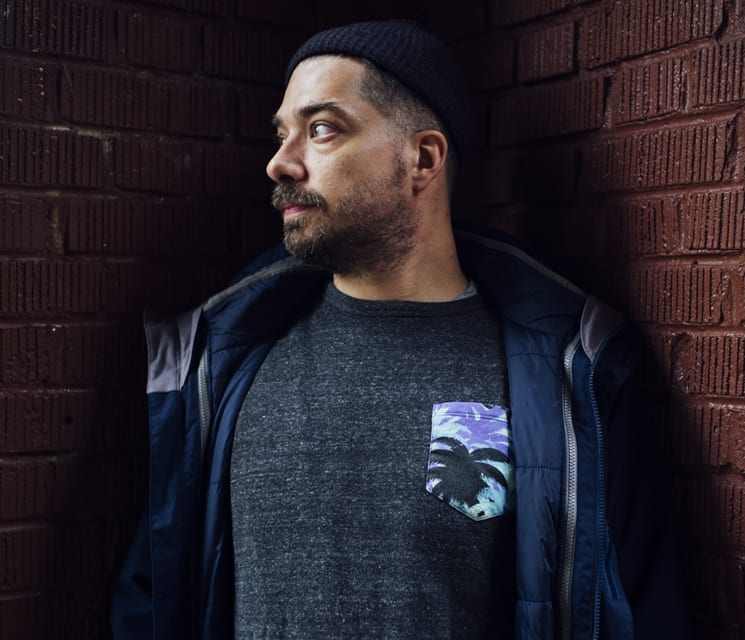Art is therapy, or so goes the narrative of countless biopics, novels and, yes, magazine profiles. But Aesop Rock's demons, much like his music, have never been so conventional.
"I can't really tell if it makes me feel 'better' or not. I don't identify it as 'therapy,'" the New York-born, Portland, OR-based MC tells Exclaim! He's speaking about the rhymes on his latest record, The Impossible Kid (out now on Rhymesayers), which are being touted as his darkest and most personal yet, covering depression, family and some turbulent years following a friend's death.
Instead of being a miracle cure to those emotional ails, Rock says hip-hop serves an even greater — albeit less glamorous — purpose. "The thing about music in my life is that it's always there," he says. "When all else has gone to shit, music is there. So perhaps in that sense it is therapy — but not in the way that I completely exorcise the demon after writing about it."
He certainly doesn't shy away from those demons on The Impossible Kid: "Water Tower" details an argument with a girlfriend that ends in the psych ward; and "Rings" vividly depicts a bout of paranoid agoraphobia that ends in nightmarish hallucinations.
It's tough to tell how much hyperbole and metaphor are used to heighten those tracks' themes, but Kid's most unflinching song, by far, is also it's most blatantly autobiographical. "Blood Sandwich" details the intricacies of his elder brother's teenage angst, and the grisly violence that his younger brother witnessed during a Little League game. The MC also shot a heartfelt video with child actors portraying his siblings.
"One of them really loved it, while the other I think appreciates it but perhaps wishes it didn't exist," Rock says of how his brothers reacted to the clip, and the song's intimate lyrics. "I get it though — we all have different sensibilities as far as being worked into a song, or [putting it] out there in public."
Indeed, Rock had no intention of exploiting his siblings, or disregarding their privacy. Yet, the vivid vulnerability in his family's story may very well prove to be invaluable.
"I think rap tends to be music for the secure. So maybe an offering that owns up to some weaknesses will reach people that couldn't find what they had been looking for," Rock says of too-scarce empathy in macho hip-hop circles. "For many, there can be a bit of solace found in just realizing they're not alone. Maybe hearing someone else just say 'Yea, I'm fucked too' is enough to make an impact."
Check out the video for "Blood Sandwich" below.
"I can't really tell if it makes me feel 'better' or not. I don't identify it as 'therapy,'" the New York-born, Portland, OR-based MC tells Exclaim! He's speaking about the rhymes on his latest record, The Impossible Kid (out now on Rhymesayers), which are being touted as his darkest and most personal yet, covering depression, family and some turbulent years following a friend's death.
Instead of being a miracle cure to those emotional ails, Rock says hip-hop serves an even greater — albeit less glamorous — purpose. "The thing about music in my life is that it's always there," he says. "When all else has gone to shit, music is there. So perhaps in that sense it is therapy — but not in the way that I completely exorcise the demon after writing about it."
He certainly doesn't shy away from those demons on The Impossible Kid: "Water Tower" details an argument with a girlfriend that ends in the psych ward; and "Rings" vividly depicts a bout of paranoid agoraphobia that ends in nightmarish hallucinations.
It's tough to tell how much hyperbole and metaphor are used to heighten those tracks' themes, but Kid's most unflinching song, by far, is also it's most blatantly autobiographical. "Blood Sandwich" details the intricacies of his elder brother's teenage angst, and the grisly violence that his younger brother witnessed during a Little League game. The MC also shot a heartfelt video with child actors portraying his siblings.
"One of them really loved it, while the other I think appreciates it but perhaps wishes it didn't exist," Rock says of how his brothers reacted to the clip, and the song's intimate lyrics. "I get it though — we all have different sensibilities as far as being worked into a song, or [putting it] out there in public."
Indeed, Rock had no intention of exploiting his siblings, or disregarding their privacy. Yet, the vivid vulnerability in his family's story may very well prove to be invaluable.
"I think rap tends to be music for the secure. So maybe an offering that owns up to some weaknesses will reach people that couldn't find what they had been looking for," Rock says of too-scarce empathy in macho hip-hop circles. "For many, there can be a bit of solace found in just realizing they're not alone. Maybe hearing someone else just say 'Yea, I'm fucked too' is enough to make an impact."
Check out the video for "Blood Sandwich" below.




